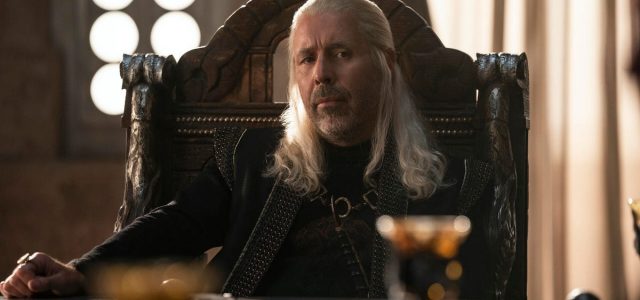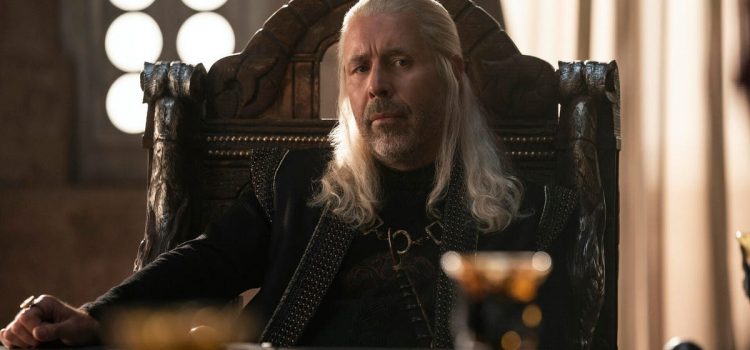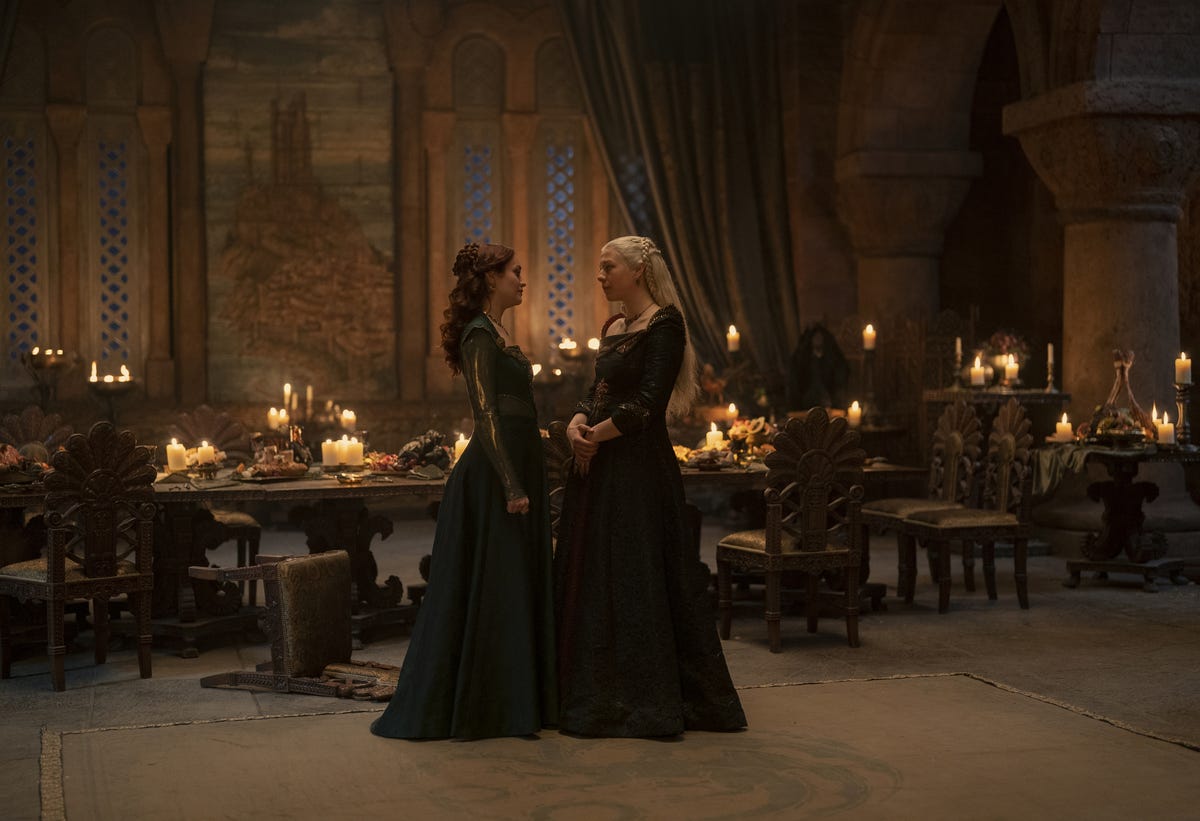


After many time jumps, episode 8 of House of the Dragon took another leap ahead. Now, six years after the events of episode 7, King Viserys looks like the walking dead, Rhaenyra and Daemon are happily coupled and making babies, and Alicent and the Hightowers have made their mark on King’s Landing by way of religious symbolism.
But that final scene was the big kicker: King Viserys unintentionally discussing the Targaryens’ important family secret — with the wrong person. Let’s discuss what that could mean going forward in the spoiler-packed section below.
Warning: Spoilers ahead.
What exactly is the Prophecy (part 1)?
All the way back in episode 1, King Viserys passes onto his daughter Princess Rhaenyra a family secret — a doomsday prophecy telling of the end of men. Let’s break down what Viserys says:
“Our histories… they tell us that Aegon looked across the Blackwater from Dragonstone, and saw a rich land ripe for the capture. But ambition alone is not what drove him to conquest. It was a dream. And just as Daenys foresaw the end of Valyria, Aegon foresaw the end of the world of men.”
Aegon refers to Aegon the Conqueror, the first Lord of the Seven Kingdoms in Westeros. He was the founder of the Targaryens’ ruling dynasty over Westeros but, as his prophecy reveals, he also wanted to unify the land against a common enemy. His prophecy isn’t to be dismissed, because before him a Targaryen, Daenys the Dreamer, had a correct prophetic dream of Valyria’s destruction by fire. Twelve years later, Valyria — the capital of the Valyrian Freehold, a large civilization in Essos ruled by dragonriders — was indeed destroyed by an unexplained cataclysm.
Viserys told Rhaenyra:
“‘Tis to begin with a terrible winter gusting out of the distant north. Aegon saw absolute darkness riding on those winds. And whatever dwells within will destroy the world of the living. When this Great Winter comes, Rhaenyra, all of Westeros must stand against it. And if the world of men is to survive, a Targaryen must be seated on the Iron Throne. A king or queen, strong enough to unite the realm against the cold and the dark. Aegon called his dream ‘The Song of Ice and Fire.'”
As we saw in Game of Thrones, this prophecy of a terrible winter comes true. An undead army of White Walkers threatens to bring a Long Night over Westeros. It’s the duty of every Targaryen king (or queen) to pass the secret prophecy on to their heir so that one day all men can unite to fight the “cold and the dark.”
“This secret… it’s been passed from king to heir since Aegon’s time. Now you must promise to carry it… and protect it.”

Alicent and Rhaenyra’s friendship briefly appears to be on the mend.
HBO
What exactly is the Prophecy (part 2)?
In episode 3, at the great hunt, a very drunk Viserys reveals that at one stage he had his own prophecy, but he lost faith in it. He tells Alicent that he named Rhaenyra his heir “out of love. Because I no longer believed…”
He doesn’t finish the sentence but goes on to speak about how there have been many dragon riders in his line, a few of whom have been dreamers, aka prophets. He then describes what he himself has dreamed:
“When Rhaenyra was a child, I saw it in a dream … A male babe was born to me wearing the Conquerer’s crown. And I so wanted it to be true, to be a dreamer myself. I sought that vision again, night after night, but it never came again. I poured all my thought and will into it. And my obsession killed Rhaenyra’s mother.”
This could explain why Viserys was willing to sacrifice his love Aemma during childbirth, believing his son would be born healthy. Viserys also tells Alicent:
“I thought Rhaenyra was the way out of my abyss of grief and regret. And naming her heir would begin to set things right … I never imagined I would remarry… that I would have a son. What if I was wrong?”
Viserys’ doubt in his decision to make Rhaenyra heir, as well as his prophecy that he would one day have a son wearing a crown, gives Alicent even more reason to believe that their son Aegon is the rightful heir to the throne.
What does Rhaenyra ask Viserys in episode 8?
Twenty years later (from the events of House of the Dragon, episode 1), a lot has happened. Rhaenyra has a brood of children and a new husband in Daemon, her uncle. She visits her father, Viserys, one night, knowing he’s probably going to die soon, to clear up the meaning behind their mysterious family secret before it’s too late.
“‘The Song of Ice and Fire.’ Do you believe it to be true?”
“Aegon’s dream.”
“You told me it was our duty to hold the realm united against a common foe. By naming me heir you divided the realm.”
Viserys is so out of it, drugged up on anaesthetic milk of the poppy, that he can’t answer whether he thinks Aegon’s prophecy, the Song of Ice and Fire, will come true.
What does King Viserys tell Alicent?
Instead, the night afterward, Viserys unintentionally gives his wife Alicent his take on Aegon’s prophecy.
In a haze, on his deathbed, Viserys begins by apologizing. “I’m sorry. I’m sorry.” This is presumably an apology for forcing Rhaenyra, whom he thinks he’s talking to, into taking on everything that comes with becoming the Targaryen heir, including bearing the family secret.
“But you wanted to know… if I believe it to be true.”
Alicent, of course, has no idea what Viserys is talking about.
“Aegon,” Viserys says.
“Our son?” asks Alicent, referring to her and Viserys’ firstborn, Prince Aegon, who was found to have raped a young servant in episode 8.
Viserys shakes his head — he’s of course referring to Aegon the Conquerer. “His Dream. The Song of Ice and Fi — It is true. What he saw in the North. The Prince That Was Promised.” The Prince is a reference to the inscription on Aegon the Conquerer’s dagger: “From my blood come the Prince That Was Promised and his will be the Song of Ice and Fire.”
Alicent still thinks Viserys is talking about their son Aegon — not Jon Snow, aka another Aegon Targaryen, aka The Prince That Was Promised.
“The Prince,” Viserys continues. “To unite the realm against the cold… and the dark. It is you. You are the one. You must do this.”
What will Alicent do with the prophecy?
From Alicent’s perspective, it certainly sounds like Viserys is asking her, his wife, to ensure their firstborn Prince Aegon inherits the Iron Throne — over the named heir Princess Rhaenyra. It sounds like Viserys is telling Alicent she is “the one” to ensure this happens, that the “Prince That Was Promised” comes from her line.
Of course, this isn’t the case — Viserys thought he was talking to Rhaenyra. This is clearly going to tear another big rift between Alicent and Rhaenyra, which is sad given their friendship seemed to be on the mend thanks to the king’s inspiring speech at the fancy reunion supper. Rhaenyra makes a toast to Alicent, thanking her for always staying by her father’s side. Alicent is seemingly genuine in declaring that Rhaenyra will one day make a good queen, implying she’s not going to fight Rhaenyra’s claim as heir.
But after hearing some of the prophecies, Alicent will likely change her mind and make a claim for the throne via her eldest son, Aegon. In episode 6, Alicent warns Aegon that one day he’ll have to fight Rhaenyra for the throne.
The thing is, Rhaenyra and Daemon also have a son named Aegon — their firstborn child, a baby introduced in episode 8. The two Aegons could potentially be pitted against one another. As episode 7 showed, Alicent is willing to become violent if it means protecting her children.
How is the catspaw dagger connected?
In episode 1, you might have noticed Viserys absentmindedly touching an ornate dagger he carries on his belt while he tells Rhaenyra about the prophecy. This dagger again appears in episode 8, beside Viserys’ deathbed when he talks about the prophecy once more.
Viserys explains the origins of the dagger in episode 4. He tells Rhaenyra that the dagger “once belonged to Aegon the Conquerer. It was Aenar’s before that. And before that… it is difficult to know.” Everything’s connected! Aenar Targaryen was Daenys the Dreamer’s father, whom she convinced to move away from the Valyrian Freehold after having a correct prophetic dream of the Doom of Valyria.
Somewhere along the way, this special dagger landed in Aegon’s equally prophetic hands. The dagger is made from Valyrian steel, crucially one of the few known substances that can kill White Walkers. It plays a huge part in making Aegon’s wish to prevent the end of men come true.
In Game of Thrones, the dagger was first used in an assassination attempt on Bran Stark (an assassin is known as a “catspaw“). In the final season, Arya kills the Night King using Aegon’s dagger, preventing the undead from “erasing the world” as Bran explains in season 7 on the Night King’s motivations.
Who’s the Prince That Was Promised?
In episode 4 of House of the Dragon, Viserys says that, before Aegon’s death, the last of the Valyrian pyromancers hid “his song” in the steel. Rhaenyra reads the inscription, visible when the blade is heated in fire: “From my blood come the Prince That Was Promised and his will be the Song of Ice and Fire.”
As we discover in Game of Thrones, the Prince That Was Promised is Jon Snow. Jon’s true name and royal lineage — his parents are Lyanna Stark and Rhaegar Targaryen — are hidden to protect him from those seeking to annihilate all Targaryens. Jon helps fulfil Aegon the Conquerer’s dream by making an alliance with Daenerys Targaryen against the White Walkers. Becoming a dragonrider, Jon helps defeat the Night King in the Battle of Winterfell, the White Walkers becoming extinct for good.
